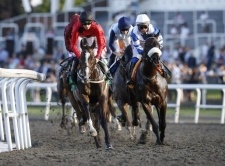
When it comes to horse racing, statistics consistently show that the favorite in the race will win 33% of the time.
While this is important to keep in mind when you are handicapping and making your bets at Bovada or another online racebook, the other side of the coin is that 67% of the time the favorite doesn't win.
Of course, not all of those non-favorite winners are huge long shots, but finding winners at high odds is obviously the goal of everyone who likes betting on the ponies. Here are some things to look for when handicapping races and finding and using long shot horses on your betting tickets.
Five Keys To Picking Long Shot Horses
1) Track Surface Conditions
A few years ago, a neophyte horse bettor we know scored a $1000 return on a $2 exacta box bet on a rainy Belmont Stakes day simply by picking the only two horses in the field that had previously won races in muddy conditions. It just so happened that those two horses were both at double-digit odds, and when they splashed home first and second, the tote board lit up.
Most horses will run most of their career races on fast dirt tracks, and only once-in-awhile have to race on muddy or sloppy tracks. In fact, sometimes a trainer will scratch their horses out of a race if the track is muddy or sloppy. You can never know how a horse will react if it has no previous experience running on an off-track, even heavy favorites.
Those long shots that do have at least one win on off tracks should get serious handicapping consideration when the track surface condition is bad.
2) Horses Switching Surfaces
The two main surfaces for horse racing in the United States are turf or dirt, and most horses run better on one surface or the other. If a horse starts its career racing on dirt but isn't getting good results, a trainer will sometimes decide, based on the horse's running style, that a switch to turf might produce better results.
These are horses to keep an eye on, because their lack of past success often means they will be at high odds in their turf-racing debut, but the change in surface might be all the horse needs to get to the winners' circle.
3) Lone Speed Horses
What this means is when there is a race where one particular horse is the obvious "speed" - the past performance information indicates the horse always goes to the lead - and it's almost a guarantee the horse will be in front of the field early in the race.
If the trainer and jockey know they have the lone speed horse in the race, they will try to take advantage of this fact and try to "steal" the race by getting as far in front as they can early in the race and hanging on as long as they can while controlling the pace of the race.
Of course this tactic doesn't always work, as using lots of energy early typically means the horse will be tiring late, but lone speed horses can be very dangerous long shots, particularly when they are cutting back in racing distance, for example from 1 1/16 miles to seven furlongs.
4) Horses Dropping In Class
This is a significant angle to consider when handicapping long shots, and most often with horses that haven't raced at the stakes level, and are dropping from allowance level races into claiming races or dropping down in claiming-price level.
While you don't often find horses taking these kinds of drops in class as huge long shots, if they haven't been winning races at the higher level they usually don't go off as the favorite in the lower level race either, and betting these kinds of horses at anywhere in the 5-1 to 10-1 range can provide excellent value.
5) Using Long Shots In Exactas
Betting long shots doesn't necessarily mean betting long shots only to win, and using them with lower-priced horses or the race favorite in an exacta can produce excellent payouts as well.
There are a couple ways to approach this kind of bet. If the race seems to include a very strong favorite, you can bet a straight exacta with the favorite on top of the ticket, and then find your one or two longshots to bet in the second-place spot.
If you think the favorite is vulnerable and your horse can get the upset, put the two horses together in an exacta box. Some horse players don't like to box horses, with the reasoning that if you box two (or more) horses, at least one of your bets is gauranteed to lose.
On the other hand, you are betting against the favorite, and from a value point of view, boxing your longshot with the favorite is a "saver" bet, so that if the race runs the way it looks on paper and the favorite does win, you will still cash out what could be a decent return on the extra $1 or $2 you've put into the bet.
Even a 2-1 favorite on top of a 15-1 long shot will return around $50 on a $2 exacta box.
See below the top sportsbooks where you can wager long shots online and choose the best one for you:

